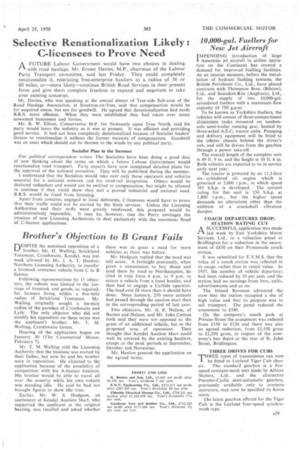Selective Renationalization Likely C-licensees to Prove Need
Page 31

If you've noticed an error in this article please click here to report it so we can fix it.
A.
FUTURE Labour Government would have two choices in dealing with road haulage, Mr. Ernest Davies, M.P., chairman of the Labour Party Transport committee, said last Friday. They could completely • renationalize it, restricting free-enterprise hauliers to a radius of 50 or 60 miles, or—more likely—continue British Road Services in their present form and give them complete freedom to expand and negotiate to take over existing concerns.
Mr. Davies, who was speaking at the annual dinner of Tees-side Sub-area of the Road Haulage Association, at Stockton-on-Tees, said that compensation would be for acquired assets, but not for goodwill. He agreed that denationalization had made B.R.S. more efficient. When they were established they had taken over many unwanted businesses and lorries, Mr. R. W. Elliott, Conservative M.P. for Newcastle upon Tyne North, said his party would leave the industry as it was at present. It was efficient and providing good service. It had not been completely denationalized because of Socialist leaders' threats to renationalize it without the former measure of compensation. Goodwill was an asset which should not be thrown to the winds by any political party.
Socialist Plan in the Summer Our political correspondent writes: The Socialists have been doing a good deal of new thinking about the terms on which a future Labour Government would renationalize road transport, Party experts have now completed detailed plans for the approval of the national executive. They will be published during the summer.
I understand that the Socialists would take over only those operators and vehicles essential for a national network ancl for road-rail integration. Others would be declared redundant and would not be entitled to compensation, but might be allowed to continue if they could show they met a proved industrial and national need. B.R.S. would be freed from licensing.
Apart from concerns engaged in local deliveries. C-licensees would have to prove that their traffic could not be carried by the State services. Unless the Licensing Authorities and their staffs were greatly reinforced, this proposal would be administratively impossible. It may be, however, that the Party envisages the creation of new Licensing Authorities to deal exclusively with the enormous flood of C-licence applications.




































































































